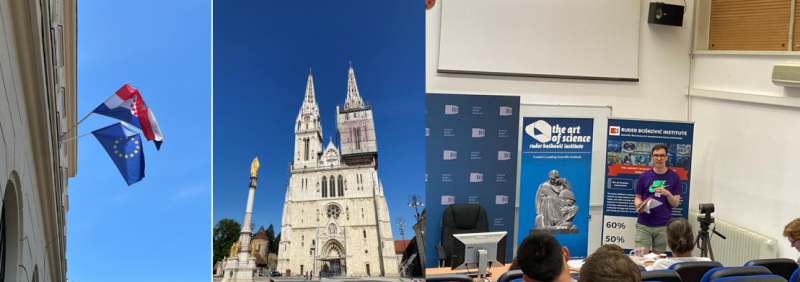Euromarine Foresight Workshop
Alastair Lough
University of Leeds

I’m grateful to the Challenger Society for awarding me their stepping stones bursary to support my attendance at the Euromarine foresight workshop at the Ruder Boskovic Institute in Zagreb Croatia (16th-17th June 2022). The purpose of this workshop was to synthesize present knowledge on the interactions between marine microbes and micro-nutrient trace metals, to identify major gaps in understanding and to discuss possible future scenarios in a changing ocean. With a view to establishing an international research programme examining ocean metabolism and nutrient cycles on a changing planet.
Microbial activities drive many ecosystem services which regulate ocean climate feedbacks and underpin marine food webs (e.g. carbon sequestration). Rising carbon dioxide concentrations will affect microbial metabolic processes which are interlinked with trace metal supply to the surface ocean. To date there are two ongoing programmes looking separately at trace metal cycles and microbial activity on a global scale, the international GEOTRACES programme and the Tara Oceans expeditions.
The first day was kicked off by a series of talks that covered the impact and distribution of trace element limitation, the role of trace elements in microbial metabolisms and making complex interactions tractable. We heard from scientists modelling processes at the cellular level to understand the uptake pathways of key micro-nutrient metals, linking metagenomic data to global carbon export, mapping nutrient limitation across the globe, diagnosing nutrient limitation in key micro-organisms, understanding the role of grazing in controlling microbial niches and the creation of clone microbes in the lab that have had specific genes “knocked out” to understand the role those genes play in producing iron grabbing molecules.
After a night at the local wine festival in Zagreb the second day of the workshop focussed more on break out group discussions. Thinking specifically about identifying and measuring key microbial processes, integrating knowledge across different methods and deciding on the big questions that a global marine microbial geochemistry programme should focus on. I was selected to chair one of the discussion groups which was a first for me. My initial approach was to be fairly hands off in controlling the discussion and see what “emergent properties” arose to coin a phrase from biologists. The discussion tended to shift towards methodological questions which were useful in terms of sharing knowledge about different ways to tackle scientific questions. The following day I took a more hands on approach to chairing the discussion by breaking down the big scientific questions into several different discussion topics with specific goals. I presented the outcomes of our discussion to the rest of the workshop which instigated useful discussions on how to create the next generation of interdisciplinary researchers through collaborative PhD programs as well as how to include modellers throughout the development of a project rather than at the end once all the data has been generated.
Profile
My research interest focuses on the biogeochemical cycling of metals in the marine environment. Specifically, how the supply of metals can both fertilize the oceans as vital nutrients for algae growth but also cause metal toxicity. There are currently large uncertainties associated with the supply and removal of Fe from the ocean which hinders our ability to predict the drawdown of atmospheric CO2 by ocean productivity in ~50 % of the global ocean. My scientific approach to understanding marine biogeochemistry is to use cutting edge microscopy and isotope methods to study the input of metals to the ocean from geological sources, the goal being to understand how the supply of metals (such as Fe) to the ocean controls primary productivity and how this may change in a warming world.
Specifically, my work largely revolves around understanding the exchange of metals between seawater and particle plumes. I have worked on plumes generated by natural processes such as hydrothermal vents and resuspension of marine sediment. I am currently researching the impact of mining deep sea manganese nodules on ocean biogeochemistry and the associated deep ocean ecosystem.
My research is linked to the international GEOTRACES programme, an international effort to understand processes that control trace element concentrations and their isotope ratios in the ocean.
Latest News
Royal Society Publishing Photography Competition 2025
Please see a message from the Royal Society below:
We are delighted to announce that the 2025 Competition is now open for entries until 15 August for a chance to win £1000! The competition celebrates the power of photography in conveying the wonder of science happening all around us and photographs can be submitted in the categories of: Astronomy, Behaviour, Earth Science and Climatology, Ecology and Environmental Science, and Microimaging.
The competition is free to enter and open to anyone studying or working in science at graduate level or above. Category winners will receive a one-year membership to the Royal Photographic Society and the overall winner will receive a grand prize of £1,000. Find out more: https://bit.ly/RSPphotocomp
October 2025 MEDIN Workshop: Marine Data Management, Governance and the MEDIN toolset
The Marine Environmental Data and Information Network (MEDIN) are pleased to announce that registration is now open for the next occurrence of our popular free online training workshop: ‘Marine Data Management, Governance and the MEDIN toolset’ on the 13th – 17th October 2025 on OceanTeacher Global Academy.
Marine Data Management, Governance and the MEDIN toolset
The Marine Environmental Data and Information Network (MEDIN) and OceanWise are delighted to invite you to attend our popular free online training workshop: ‘Marine Data Management, Governance and the MEDIN toolset’ on the 19th – 23rd of May 2025.
